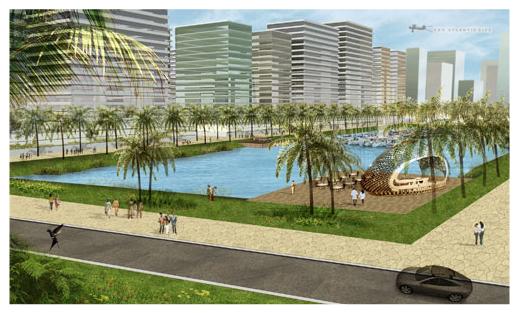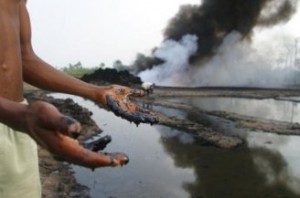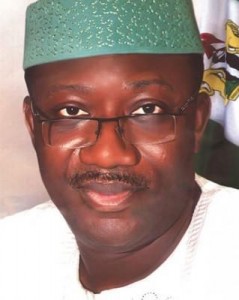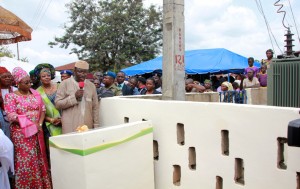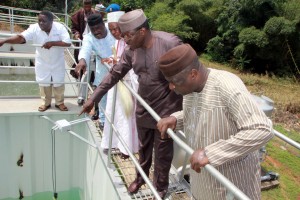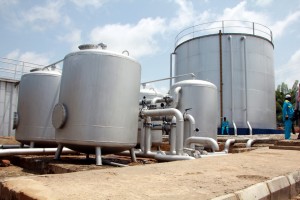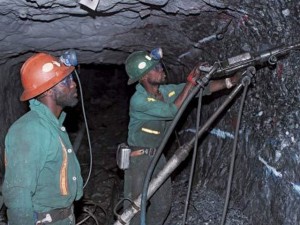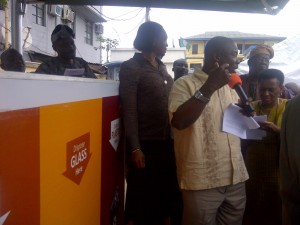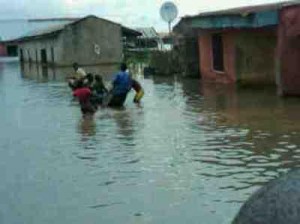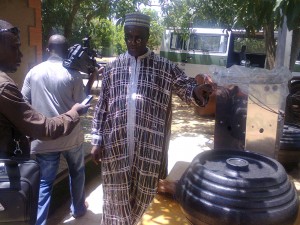Some fundamental legal issues regarding the construction of the Eko Atlantic City as well as the veil of secrecy surrounding the Environmental Impact Assessment (EIA) report have come to the fore, just as key players continue to advance contradictory positions regarding the project.
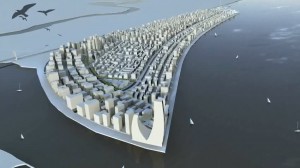
The real story is unfolding on the heels of glaring inconsistencies in the positions being taken by the Lagos State Government/South Energyx Ltd, the proponents and executors of the project on one hand, and the representatives of the Federal Ministry of Environment, which is constitutionally empowered to ensure all projects comply with the EIA Act of 1992.
Recent revelations by government officials about the new city being built on land reclaimed from the Atlantic Ocean confirmed various reports by this writer since November 6 last year. One of the reports had stated categorically that the Eko Atlantic City project was being done with very little respect for due process.
One of the stories won the CNN/Multichoice Highly Commended Award in the environment category at the 2012 Africa Journalist of the Year award, which held in Lusaka, Zambia.
A representative of the Federal Government caused a stir at a recent forum on the project when he remarked that there was a lot of lawlessness in the process that led to the execution.
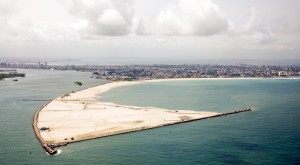
He also talked about the futility of looking for foreign-driven solutions from experts who are unaware of the geography and geology of the local terrain.
Indeed, startling facts about the Eko Atlantic City project came up at two separate events recently. The first was organised in Lagos by the United Nations Development Programme (UNDP) in collaboration with the Lagos State Ministry of the Environment. The second was put together by the Heinrich Boll Foundation, an NGO affiliated to the Green Party in Germany. The event was held in collaboration with Environmental Law and Research Institute and Community Development and Development Initiative.
Ironically, the Nigerian Institute of Oceanography and Marine Research (NIOMR), Victoria Island, venue of the second gathering of stakeholders, is the very place where various age long researches puncturing the EIA, which the executors of the Atlantic City project claimed they had done, originated from. The impact assessment, it was claimed, was carried out, by an Institute in Denmark.
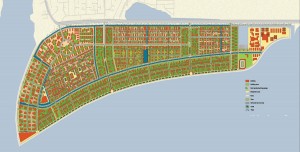
Investigations spanning over nine months revealed the several natural forces hidden beneath the Atlantic Ocean bed, the genesis of erosion at Victoria Island and the deadly ocean surges that have occurred in the state in the last decade. The results of the investigations eventually triggered a discussion on the desirability of the Atlantic City project and the exact nature of the EIA submitted by Lagos State Government
and South Energyx Ltd.
At the UNDP event, which had: “Challenges of Sea Level Rise Induced Flooding in Nigeria: Coastal States in Focus as its theme, Commissioners for the Environment from Lagos, Akwa Ibom, Bayelsa, Cross River, Ondo, Ogun, Delta, and Rivers states attended or sent their representatives. Papers were delivered by: Prof. Emmanuel Oladipo, Prof. Jide Alo, Prof. Labode Popoola, Prof. Niyi Osuntogun, Prof. Francis Adesina, Dr. Victor Fodeke, Dr. Taofeek Afolami and Special Adviser to Governor Fashola.
Lagos State Commissioner for Waterfront and Infrastructure Development, Prince Adesegun Oniru, who was to deliver a paper titled: “Eko Atlantic City: A formidable Adaptation Strategy to Rise in Sea Level Induced Erosion in Lagos State” did not do this at the event .
Oniru, however, showed up at Heinrich Boll Foundation Roundtable the following week. Despite the heavy rainfall in Lagos on the day, the event was well attended. The UNDP Deputy Country Representative, Jan Thomas Hiemestra, was in attendance. Others who attended include Prof. Larry Awosika, a renowned Marine Geologist and UN expert on Oceanography; and Prof. Mrs. M. T. Okorodudu-Fubara, foremost Environmental Law Professor at the Obafemi Awolowo University and Consultant to United Nations Environment Programme (UNEP), was also there.
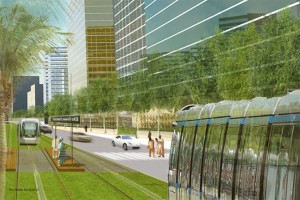
Mr. David Frame, Managing Director of South Energyx Ltd was also there, alongside Mr. Abass Suleiman of the Federal Ministry of Environment, Abuja. It was at this event that the Federal Ministry officials debunked the claim by Lagos State officials at the UNDP event that they (federal officials) were solidly behind the EIA that was drafted on the Eko Atlantic City.
Lagos State Environment Commission, Mr. Tunji Bello, had said at the first UNDP parley that it was when the Federal Government abandoned its responsibility in finding lasting solutions to the problem of the Bar Beach that the Lagos State Government approached former President Obasanjo. He said the former President then gave his nod for solutions to be found. Bello lamented that previous governments had been dumping sand in the Atlantic Ocean to replenish the Beach at huge costs.
He said: “We know that the kind of Federal Government we have is highly unresponsive. It does not respond to anything. They don’t have the capacity, the mentality and they don’t even think about it (problems posed by the Atlantic).
“But being a state government, we know we don’t have land, and that we are the smallest. During the administration of Governor Bola Tinubu, it was a running battle between him and Obasanjo. They were just pumping sand. Every year, they spent N9 billion pumping sand into the Atlantic Ocean. Within six months, the sand would disappear and they would pump sand again.”
Bello continued: “Governor Tinubu said we can do something about this. We can build a defence wall instead of spending that amount of money on pumping sand. He wrote a letter to Obasanjo. It was a running battle. Eventually, he (Obasanjo) said, Give it to them.
“If you go to Bar Beach now, the Ahmadu Bello Way, which had totally disappeared, when Asiwaju (Tinubu) now decided to build that defence wall that side was saved. In fact, almost all the state’s liaison offices were almost eaten up by the erosion. They were no longer using their buildings. Today, the defence wall has restored normalcy to that area.
“The features of Eko Atlantic City, is to protect Victoria Island from ocean surge, give Lagos a facelift by transforming it into one of the best tourist centres in the world and create job opportunities.”
When the issue of the EIA was raised, state officials said the Federal Government was responsible for the EIA, which Eko Atlantic City based its construction work on.
However, a week after at the Heinrich Boll Foundation Roundtable, Prof. Okorodudu-Fubara picked holes in the manner Lagos State seemingly circumvented laid down regulations with respect to the construction of the estate.
Okorodudu-Fubara, one of the legal minds that put in place the EIA Act in 1992, expressed regret that the purpose for which the law was made had not been adhered to in the construction of the Eko Atlantic City.
She said the EIA Act prohibits the execution of private or public industrial development under the mandatory list schedule to the statute without prior consideration of the environmental consequences of such a proposed action, in the form of an environmental impact assessment (EIA) and a certificate in writing by the Federal Ministry of Environment signifying approval to commence.
“The statute legally forbids such erring projects. Is the Eko Atlantic City Project EIA Act 1992 compliant? All indications point to the fact that the answer is a big No.”
According to the renowned professor, Section 61 of EIA Act of 1992 states: “Any person who fails to comply with the provisions of this Act shall be guilty of an offence under this Act and, on conviction, in the case of an individual to N100,000 fine or up to five years imprisonment and in the case of a firm or corporation to a fine of not less than N50,000 and not more than N1, 000,000.”
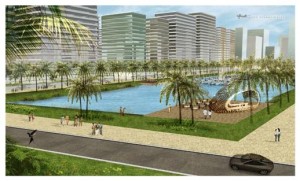
She continued: “Any corporate body, which contravenes the Act shall be guilty of an offence and shall on conviction be liable to a fine not less than five million naira (N5,000,000). In addition to the penalty provided, a person/body corporate found guilty shall be required to carry out remediation work.”
The professor stunned the gathering, precipitating a pensive mood, when she submitted: “Eko Atlantic City project, a fantastic idea, but it triggers off a wide range of extant critical statutes and regulations.
“The proponents must be brought back to conformity and compliance in accordance with due process. The individuals and firms involved in the project may be found guilty of offences under section 61 EIA, 1992.”
Prof. Okorodudu-Fubara recommended that an Executive/Administrative order of prohibition be placed on the proponents of the project pending due compliance with all the applicable laws.
On the way forward, she called for a two-track solution on legal and political basis, to examine civil or criminal violations of extant laws triggered by the Eko Atlantic Project. She also called for a thorough investigation of individuals and firms involved and the prosecution of those found culpable.
“A prohibition order could be placed on the proponents of the project to compel total compliance with EIA Act, 1992. and no further action until an approval is obtained.”
On the political side, the professor recommended mediation by Federal Government and Lagos State Government, a process she said must be against the backdrop of the applicable laws, essentially the constitution and all other relevant federal laws.
She concluded that Lagos and the Federal governments should carry all stakeholders along in the overall public interest.
From the presentation, it was gathered that the current position on the project is that there is no EIA at all because the Federal Government has withdrawn the draft impact assessment, which was put up by Lagos State because they had too many reservations about it.
The professor cited the case of Attorney General of Federation V Attorney General of Abia & 35 ors, wherein the Supreme Court declared, “the continental Shelf is not part of the territory of a state contiguous to it.”
During the roundtable, Prince Oniru said the problem of coastal erosion and the dangers of sea level rise were not peculiar to Lagos shoreline alone. He explained that the entire coastline of Nigeria was being affected and as such the solution had to be found collectively.
Oniru told his audience that the situation in Lagos was the result of the constitution of the East and West Moles in the early 20th Century to prevent sand from blocking the Lagos harbour. He noted that this piece of engineering on the moles was responsible for erosion of Bar Beach, which is, however, being corrected by Lagos State.
Discussants at the roundtable also threw more light on the status and nature of the Environmental Impact Assessment. Officials of the Federal Ministry of Environment pointed out that the EIA put on display was for dredging activities. Officials had also noted that dredging commenced in 2008. The EIA was only put on display in 2011.
However, permission was granted through certification from the Federal Ministry of Environment. Mr. Abass Suleiman, Assistant Director, Federal Ministry of Environment, Abuja said that a certificate was granted to South Energyx Ltd for dredging activities by Royal Haskoning, but that this was a provisional approval pending the outcome of the EIA. Suleiman admitted the EIA submitted by the Lagos State was one of the best he had ever seen and that the Nigerian Institute of Oceanography Marine Research (NIOMR) contributed to it.
Strangely, however, Mr. Victor Imevbore of Environmental Resources Managers Limited, denied that he had ever been associated with the EIA. Imevbore was unhappy that his name had appeared in the EIA document without his knowledge. According to him, technically, he believes that the construction of the sea wall, or revetment would be feasible even if he had doubts as to the ensuing impacts on other coastal areas, adjacent to Bar Beach.
Imevbore regretted that despite the good work being done by Governor Fashola in Lagos State, the Eko Atlantic City Project was ill advised.
Prof. Larry Awosika of NIOMR, confirming what Suleiman said, recalled being consulted on the EIA; and that the NIOMR made its views known to the Federal Government. He, however, did not disclose the observations or advice the agency made about the dredging and the proposed Atlantic City Project.
On his part, marine biologist, Ako Amadi, said the essence of any EIA is to demonstrate how to reduce risks and manage potential disaster emanating from a project. As in the case of the Eko Atlantic City, he said, the EIA was not necessarily about how dredging companies carried out their work in building a sea wall. Amadi said that the EIA submitted by Royal Haskoning on the dredging activities only made peripheral statements on safety issues and did not go into the forensics of climate change impact, nor did it offer any palliatives should unmitigated environmental disasters occur in the future.
During the roundtable, Prince Oniru was asked to give his views on the social impacts of the forceful eviction of residents of Makoko and Bar Beach, after a 72-hour ultimatum. Some other guests also wanted to know whether the proposed Eko Atlantic City made provision for low-cost housing. Oniru denied that the eviction notices gave only 72 hours, a position that contrasted testimony given by one of the lawyers of the evictees, Mr. Felix Morka.
This reporter also saw copies of the notices, which were signed by Ministry of Water Front Infrastructure Development.
Oniru told the gathering that the Eko Atlantic City Project was envisioned as a high profile development that would not be housing poor people. This, he explained, is the case in similar places all over the world.
But other experts at the gathering challenged him, saying that the world has started moving towards sustainable cities, which take low-income groups into consideration. Mrs. Kofo Adeleke cited London as an example while Prof. Mrs. Okorodudu-Fubara mentioned New York as another example.
Other participants at the roundtable shared their thoughts on this very controversial project. Their views are captured below:
Prof. Larry Awosika, United Nations Commission on the Limits of the Continental Shelf; Marine Geologist, Nigerian Institute of Oceanography and Marine Research (NIOMR): “Many times we are besieged by the government and people on this particular issue and we say in most cases, we are not carried along. I am happy that the Honourable Commissioner said they have a holistic plan for coastal erosion mitigation along the coastline. We are happy to hear that.
“But what we will like to say is that (NIOMR) is mainly saddled with experts, though they may be local experts, they are also international experts. They should also be brought on board to assist the government not as contractors but as experts and agency of government to ensure that the job is done to specification. We give scientific advice. We do for other states, we do that for other countries and I see no reason why we cannot do it for our country.”
Mr. David Frame, Managing Director, South Energyx Ltd,: “I just want to say that people have short memories. I have been a Lagosian for 24years. I am talking as someone who has made Lagos my home. We forget that Ahmadu Bello Way blasted into the sea in 2005. We have forgotten that. It’s past. But it’s very relevant to what we are saying; as a gentleman said earlier; Victoria Island is not protected. So, please bear that in mind. We also talked about approval by the Federal Government; the Commissioner touched on that earlier.
“And I will reconfirm that Lagos State was approached by President Obasanjo in 2005. He gave them consent to construct a permanent solution to the erosion at Bar Beach. That permanent protection is Eko Atlantic Project. The fact is that project had to start immediately. If we had not done that, Lagos, Victoria Island will not exist as it is today. We will not be sitting in this room right now. That’s my message.”
Prince Adesegun Oniru, Commissioner for Water Front Infrastructure and Development: “Lagos State will continue to work to protect lives and property along our coastline. Everything that has been said is noted. I will pass on most of your comments to his Excellency, the Governor of the State. I will just like to touch on one thing that we didn’t talk about which (environmental activist) Desmond Majekodunmi knows very much about. And that’s the cases of abandoned vessels and shipwrecks along our coastline. It’s a major problem. Shipwrecks worsened the erosion of Maiyegun and Alfa Beach.
“That Atlantic Ocean is our national boundary. We have an agency saddled with the responsibility of pulling the wrecks out. That agency is the Nigeria Maritime Authority and Safety Administration (NIMASA). It’s a shame that nobody from NIMASA is here. But be that as it may, we in Lagos State will continue to look for proper and holistic solution to the threats to our coastline, alongside other states that have boundaries with the Atlantic Ocean.”
Victor John, Federal Ministry of Environment: “We need to re-study the domino effect of the (Eko Atlantic City) project. It is very important. I am a Lagosian and from the things I am seeing, I need to look at the design again to know what other mitigation efforts we need to put in place. But I am happy that the Commissioner said Lagos State Government is coming up with other measures for the shoreline. It is very important. We don’t want to get involved in the project at all. But as Lagosian who lived on the project, any time there is any problem, be sure
that we will be there.”
By Tunde Akingbade

